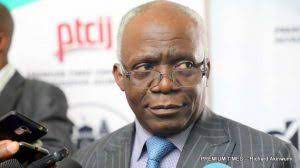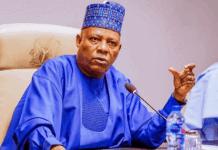Human rights lawyer, Femi Falana, SAN, has called on President Bola Tinubu to ensure that the 2027 elections are credible and that “the shame of…
Human rights lawyer, Femi Falana, SAN, has called on President Bola Tinubu to ensure that the 2027 elections are credible and that “the shame of bad elections in Nigeria must stop.”
Falana made the call in an interview on Channels TV on Friday, where he said that successive regimes in Nigeria had set up electoral reform committees, but their recommendations had not been implemented.
Falana said that the appointment of card carrying members of political parties or loyalists of parties as Resident Electoral Commissioners or National Commissioners complicated INEC’s ability to have credible elections.
He said, “The commitment to have a credible elections in 2027, the shame of bad elections in Nigeria must stop and President Tinubu has a duty not only to encourage INEC to conduct good elections, he must also ensure that his promises to have credible elections in Nigeria.
Falana seeks recovery of unremitted $34.2bn NLNG dividend
Judges shouldn’t determine winners if INEC conducts proper elections – Falana
“As matter of fact, since 2007, successive regimes in Nigeria, Yar’Adua regime, Jonathan regime and Buhari regime have all set up electoral reform committees or panels to make recommendations that will assist the government to have credible elections.
“In the case of President Tinubu, as a leader of ACN, Asiwaju Bola Ahmed Tinubu set up a committee to campaign for the implementation of the recommendations of Uwais Panel and one of them is that we must have independent umpires.
“You can’t have a card carrying member of a political party or a loyalist of a party to be a Resident Electoral Commissioner or a National Commissioner, you complicate for INEC to have credible elections.”
Falana reiterated his stance that judges should not determine the outcome of elections, given that Nigeria has the highest number of election petitions worldwide.
“We need to resolve that never again are we going to allow judges to determine or confirm the results of elections. It doesn’t happen anywhere in the world, and that is why I repeatedly challenge my colleagues; are you aware that we have the largest number election petitions in the world?
“This year we recorded the lowest number of electron petitions since 2003, we have 436 petitions, in 2019 we had 807, in 2007, the worst elections we have ever conducted in Nigeria, Nigeria recorded 1,282 petitions.”
The minister explained that though the programme was for an immediate cushioning of the economic shock that these households experienced as a result of fuel subsidy removal, it would contribute to lifting 61 million households from poverty.
Edu, who said the process was being carried out rigorously to ensure that the right people get the money, stated that the government was identifying the beneficiaries, verifying their identities through their NINs and BVNs, and ensuring that they were paid.
The minister stressed that the government did not want to rush into paying people and then realise that they didn’t even exist.
Asked about the specifics that would ensure 50 million Nigerians were removed from poverty, she said: “So, we have a couple of things that have been listed out. First and foremost, as you know, there is an ongoing payment of N25,000 to poor households in Nigeria, and this is going to happen for three months, amounting to N75,000.
“Now, this is an immediate cushioning of the economic shock that these households are experiencing. However, we’re taking our time going through the rigorous process. And the reason is simple; We want to be sure that the right people get the money, we identify them, they have their NINs, they have their BVNs and they paid. We don’t want to rush into paying people and then you realise that they don’t even exist.
“That’s why we went through the process of verification, and payments have started. Different states across the country can attest to this; individual poor households as well. And this we will make public so it’s not even secret. Public so that Nigerians can hold us accountable.
“This is 15 million households, which automatically amounts to about 61 million persons. Beyond this, the President is going to be creating jobs for millions of Nigerians through different methods. We’re providing zero-interest loans for markets, petty traders, market women, amongst other people.
“We’re also supporting poor farmers. We’re bringing on board the End Hunger Project, we’re equally bringing on board the Good Nigeria Project, and several other projects. And each of these projects has the targeted amount of persons who we want to reach through our social safety net projects.
“We have the people who want to reach and an addition of all of these people together will give us a way over 50 million persons that will be directly reached by the government of President Bola Ahmed Tinubu.”
The Minister also emphasised the importance of collaboration between her ministry and other ministries to address the multi-dimensional issue of poverty in Nigeria.
Edu stated that poverty is multi-dimensional and some people are poor because they do not have access to education, quality healthcare services, or jobs.
She assured that her ministry is collaborating with the Ministry of Finance, Ministry of Health, Ministry of Education, Ministry of Agriculture, among others, to pull Nigerians out of this multi-dimensional poverty.
On how her ministry will synergise with other ministries to address health care and quality education as a means to fight poverty, Edu said: “So, we’re running as a team. It is a multi-dimensional issue that has been dealt with. Remember, it’s multi-dimensional poverty. So some people are poor, because they do not have access to education.
“Some people are poor because they do not have access to quality healthcare services. Some people are poor because they do not have access to jobs.
“So it’s multi-dimensional. And we are collaborating as a ministry with the Ministry of Finance, Ministry of Health, Ministry of Education, Ministry of Agriculture, amongst others, to see that we can pull Nigerians out of this multi-dimensional poverty.”
Speaking on the impact of the retreat, Edu said: “It has been very informative, especially as it concerns administration, governance, leadership, and actually managing the affairs of government at this level. For many persons, this has been very useful in setting the agenda for government.”

























